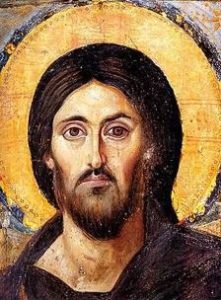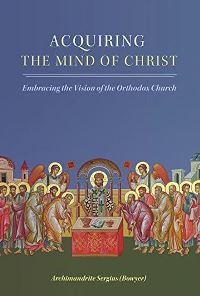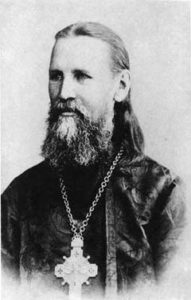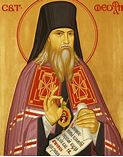SSCORRE!
Saint Sophia Cathedral
Online Resources for our Religious Edification

Topic of the Week –
Acquiring the Mind of Christ
“…All Christians, clerical and lay, have often become aware that if there is a burning topic and a great contemporary need, it is the need to acquire the mind of the Church.
Our mind should be permeated by the mind of the Church. Our thought, life, mode of living, our desire, our will should be altered by the good alteration effected by the life of the Church.
The Apostle Paul urges, “Let this mind be in you which was also in Christ Jesus” (Phil. 2:5). But since the Church is not a human organization, but the holy and blessed Body of Christ, therefore we too are commanded to think with the catholic mind of the Church and be animated by the life of the Church, not to do anything apart from its life and teaching…”
Acquiring the Mind of the Church by Metropolitan Hierotheos Vlahos

We must examine ourselves and realize the tremendous impact the modern non-Christian worldview has on us as Orthodox Christians. We must seek to put on the new man and to put off the old with his thinking, habits, and perspectives. Only the radical change afforded to us by profound repentance has the potential to remake us in the likeness of Christ.
I offer the thoughts in this book not as an end, but as a beginning, looking to challenge modern thinking and presuppositions that are commonly held by all of us, but not often perceived or understood. The contents of this book are meant to be a compass to point in a more Orthodox direction. It is important to remember that what we believe will have a direct impact on how we act inside and outside the Church, and ultimately what we perceive the mission of the Orthodox Church to be. It is our task then to leave aside those things which are not conducive to our salvation – especially opinions, thoughts or mindsets – that will not help us attain our ultimate goal: communion with God.
The task of repentance is literally a change of mind. Our goal is to acquire the Mind of Christ which is the Mind of the Church. The Scriptures show us this Mind. The Church services reveal to us this mind. The Fathers and saints of the Church open to us this Mind….
Let each of us begin anew this day seeking that which is above, forgetting what is behind, and pressing onward to the high calling in Christ Jesus our Lord….” (xiii-xv)
Excerpted from Acquiring the Mind of Christ: Embracing the Vision of the Orthodox Church by Archimandrite Sergius

Read this story about Repentance.
How did the man appear to Saint Paul the Simple before he went inside the church? How did Saint Paul see him after he came out of the church? What happened to make this change?
How are we perhaps like the man in the story? What can we do for ourselves so we are changed like the man?
Purchase the series of children’s stories by Elder Cleopas here.
“…there are many Christians today who do not have the mind of the Church, that is to say, their mind is on “earthly things” (Phil. 3:19). Their mind is estranged from the mind of the Church; it is simply worldly. Their life is not in tune with the mind of the Church….
Sometimes however, we do not know just what the mind of the Church is. We identify it with a blind obedience to some general laws or else we connect it with outward things…. we divide people as being of the Church or not, by external things and by characteristics which we construct according to our passions.
All the holy Fathers teach that man’s salvation is a combination of sacraments and asceticism. We cannot understand the sacraments without asceticism in Christ, and we cannot live a real ascetic life without the sacraments of the Church. Moreover, the whole life in the Church is an experience of a great mystery….
To have an Orthodox mindset (phronema) means a man’s complete turn of mind in all things, from the way he lives to the relationship he has with God. And literally, if the nous (spiritual intellect, “eye” of the soul) is darkened, then the whole mind is carnal. But if the nous is illuminated, which means that it has the Holy Spirit within it, then the whole mind is a mind of spirit and, of course, a mind of the Church.
When we speak of having an Orthodox mind, we mean chiefly that our nous is the nous of Christ, as the Apostle Paul says, or at least that we accept the experience of the saints and have communion with them. This is the way of the life of the Orthodox Tradition and the way of life of Christ’s life….
….the theology of the Church is ascetic, that is to say, it defines the methods of cure in order for man to attain deification. So the dogmas express the revelation and the life which the Church has, and they also cure man and lead him towards deification. They are spiritual road signs. In this sense we can say that the dogmas save man and sanctify him. This happens because they cure him and give him the right orientation on his way towards God.”
Excerpted from Acquiring the Mind of the Church by Metropolitan Hierotheos Vlahos
Read the story Repentance. How did the sinful man experience sacraments and asceticism in the church? How did it cure him and give him the right orientation on his way towards God? How do you know this from the story?
Do you have the mind of Christ, or is your mind on earthly things? What can you do to change this? If you don’t know a lot about scripture, the lives of the saints and their teachings of the church, what will you do to learn more about them to give yourself the right orientation towards God?
“…Today is the day of salvation and the time is far spent. It is time to awake from the slumber of the world and to put on Christ, beseeching Him to grant us continual renewal of our repentance and of our life in the Church. It is time to put spiritual capital into our bank account in eternity, so that when we fail, we will be received into the eternal habitations. The Church’s Liturgy and a life of personal prayer prepare us to live in God’s presence, to endure God’s presence, and to love God’s presence. We must make this preparation in this world, otherwise, in the world to come, there will be no more time for us to make the appropriate adjustment to that which “eye hath not seen, nor ear heard, neither have entered into the heart of man…” (I Cor. 2:9)
Read the story Repentance. How was the sinful man’s repentance and his life in the church renewed?
Why does Archimandrite Sergius say that “today” is the day of salvation? Do we know anything about tomorrow? What is the world in “slumber” about? How may we obtain a continual renewal of our own repentance and of our life in the church?
A Message from Maria Spanos
I am passionate about our Orthodox Christian faith and seek to help others learn as much as they can about it. My purpose here is to share online resources that help strengthen our relationship with Christ and bind us closer to His Church. I believe they are invaluable in learning about our precious Orthodox Tradition, and are a great aid for teaching family members, friends and others about Orthodoxy. ~Maria
Two of my favorite quotes:
 “A true Christian behaves in this life so that it may be a preparation for the future one and not only a life here below. In his actions, he does not think what will be said of him here but of what will be said there in heaven; he represents to himself that he is always in the presence of God, of the angels and all the saints, and remembers that someday they will bear witness of his thoughts, words, and deeds.” — Saint John of Kronstadt
“A true Christian behaves in this life so that it may be a preparation for the future one and not only a life here below. In his actions, he does not think what will be said of him here but of what will be said there in heaven; he represents to himself that he is always in the presence of God, of the angels and all the saints, and remembers that someday they will bear witness of his thoughts, words, and deeds.” — Saint John of Kronstadt
__________________________________________________________

“Of all the holy works, the education of children is the most holy.”
— St. Theophan the Recluse






